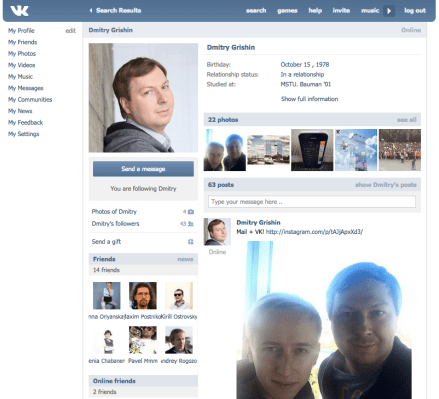Some big shareholder shifts at Vkontake, the social network with 92 million monthly active users that’s often described as Russia’s Facebook and has been embroiled in political controversies that resulted in the ousting of its founder, Pavel Durov. Mail.ru, the publicly-traded Internet giant, has now taken full ownership of the company, by buying the 48% it did not already own for $1.47 billion, buying the shares in an all-cash deal from previous shareholders Blesmir Development Limited and Palagon Limited.
As a result of the VK deal, Mail.ru has also negotiated to drop all litigation between United Capital Partners (UCP, the company behind Blesmir and Palagon) and Durov over Telegram, the secure messaging app Durov developed alongside VK, whose ownership was being contested. “UCP, Mail.Ru and Pavel Durov have also agreed that simultaneous with this acquisition all the outstanding litigation, and claims concerning VK and related matters between these parties will be dropped with immediate effect,” a statement from Mail.ru says.
“We are happy to announce the acquisition of 48,01% of VKontakte stake from UCP. The consolidation of 100% of VK and the termination of all outstanding shareholder disputes will allow focus on the product and its further development,” Mail.ru CEO Dmitry Grishin said in a statement. “We respect the successful results driven by VK’s team and do not plan any significant changes in the team or the product itself. Moreover, we are ready to give the current team an opportunity to realize their plans and initiatives.” He also celebrated with a little commemoration on Instagram.
“I welcome the decision of my former partners to abandon their claims toward Telegram and to transfer the American entities under my control,” Durov said. “For my part I acknowledge the dismissal of claims against UCP and congratulate all parties involved in the settlement.”
Mail.ru says that, alongside the price it paid for its previous 52% of VK in 2007, it’s total outlay for the social network has been $2.07 billion. Mail.ru funded the deal with existing cash and with a 22.2bn rouble ($585 millin at CBR rate) 11.5% fixed rate 4 year loan from Gazprombank, the company says.
The deal closed today.
The deal means that Mail.ru now fully controls the two largest social networks in Russia, VK (as Vkontakte is known) and Odnoklassniki (“Classmates” in Russian). Mail.ru had also been a shareholder in Facebook until 2013.
The move is a sign of consolidation in the Russian social market, and it will be worth watching to see whether Mail.ru decides to consolidate the two operations into one brand. In any case, what Mail.ru will likely do is consolidate on the monetising end, now with a larger pool of pages and viewers across which to sell advertising.
By buying VK, Mail.ru is picking up a profitable social network, albeit at a much more modest rate than its US counterpart. In 2013 VK’s revenues went up 14% to RUB3.8 billion ($98 million) with net profit of RUB 53 million ($1.3 million). In the first half of 2014, VK had revenues of RUB2.0 billion ($52 million) and net income of RUB248 million ($6.4 million).
VK, the most popular social network in Russia, has been at the center of two different controversial currents, which have sometimes been played against each other by interested parties.
On the political front, Durov has accused Russian authorities of leaning on VK’s shareholders and management to remove content that was critical of Kremlin policies, specifically around the very hot subject of what is happening in Ukraine and Russia’s future role in the country.
It’s unclear how and if Mail.ru will act on this front, and given how media has been progressing in the country, whether we will even hear about it if Mail.ru does bend to such requests.
On a less political but equally charged front, VK has been effectively accused of “aiding and abettting” in the world of content piracy. The network has become a de facto exchange platform for people sharing music without a whiff of royalties to music labels and other rightsholders. VK has said it’s working with labels, but all the same there are ever-present threats of lawsuits at the door.
Regardless of how those two areas resolve themselves, VK is certainly not shy today to act when it sees content that it deems inappropriate, recently making moves to shut down accounts deemed to be run by ISIS and ISIS sympathizers.
